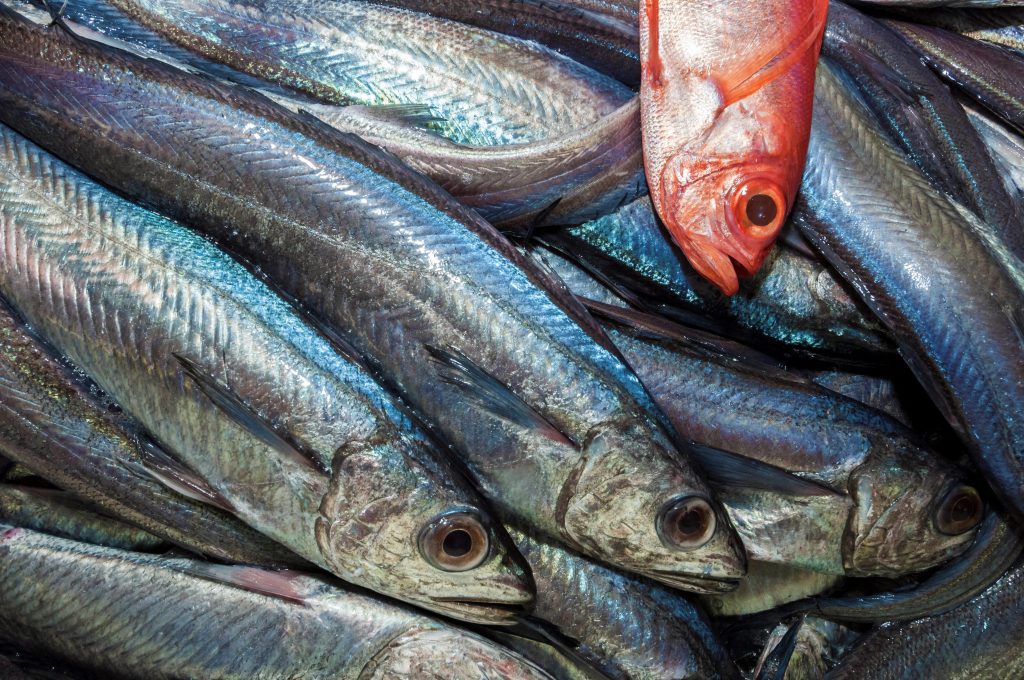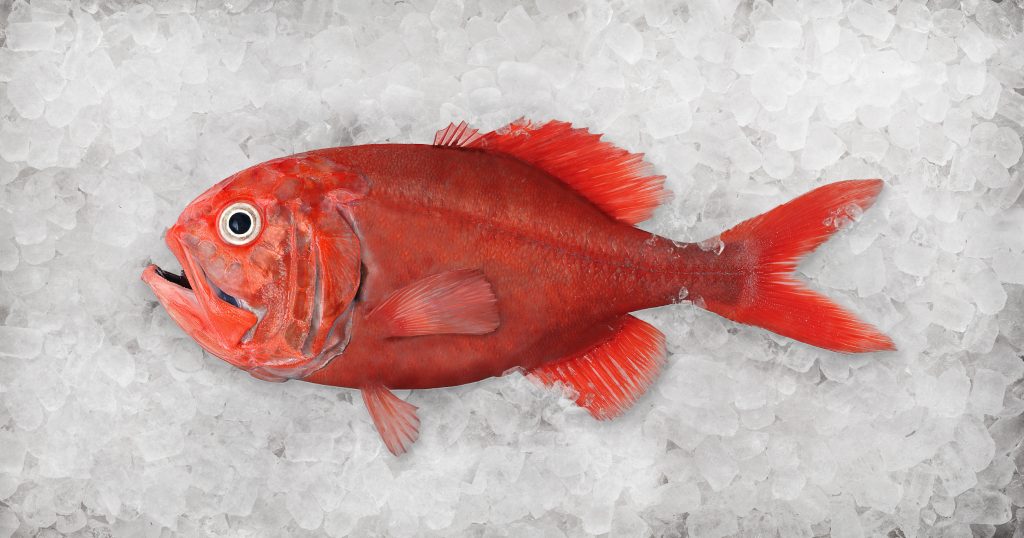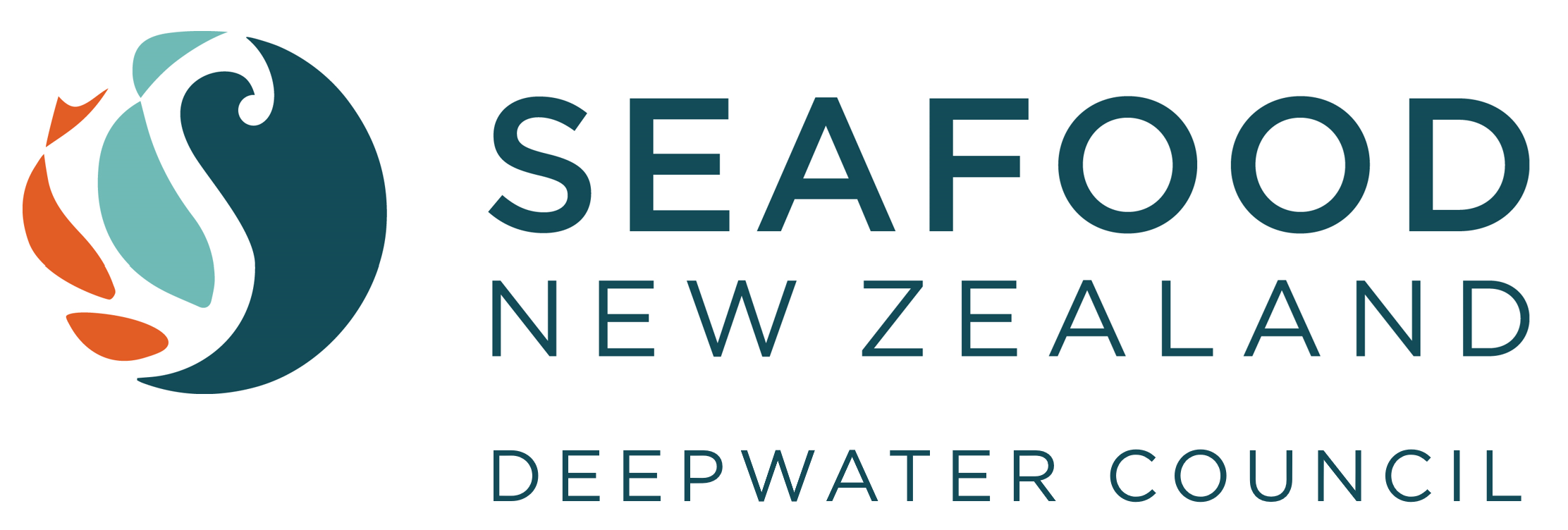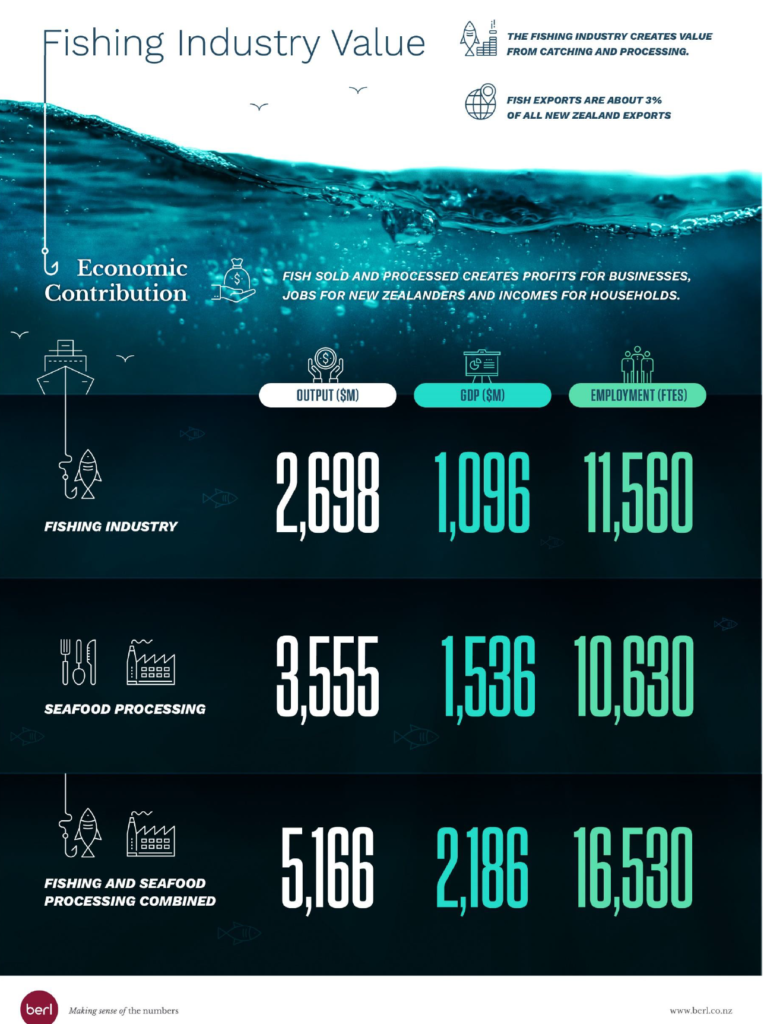This video walks you through some of the latest science on fishing globally. What are the real impacts on the environment? Is fish really a low carbon protein? Watch this if you want to bust some of the myths you might have heard about how commercial fishing really works.
DWC 2022-23 Annual Report
Our annual report provides an overview of our activities and achievements over the past year, as well as key statistics and information about NZ's deepwater seafood industry
Caution is best for orange roughy
We have self-suspended the Marine Stewardship Council (MSC) certificate for the East and South Chatham Rise fishery – not because of stock level concerns, but because the MSC standard requires there to be a stock assessment.
Getting to the Bottom of the Facts on Trawling
As an industry we are open to conversations about where we fish and how. We have already prohibited trawling from 30% of our fisheries waters to protect the seabed. We are also investigating new fishing technology to reduce our impact. Is trawling the terrible thing that some commentators believe it to be? No. But it can be improved. We are working to improve it, with good science as our guide.
A new Government means new opportunities to focus on the science
In the words of the scientists behind the study, “seabed status is high in regions where fisheries are exploited sustainably – emphasizing that good fishery management contributes to better ecosystem outcomes.”
The environmental footprint of global food production
In 2022 a paper appeared in Nature Sustainability entitled "The environmental footprint of global food production." It has many good aspects but did grossly overestimate how much fishing impacted marine ecosystems. The Washington Post took this paper and produced a food calculator that suggested that most fish had a higher environmental footprint than beef. Please click here to read Ray Hilborn's rebuttal published in Nature Sustainability on 25 September 2023.
‘Misc and chips’ for dinner anyone?
People in Auckland, Waikato and beyond face a shrinking choice of seafood options at supermarkets, fish and chip shops and restaurants under the proposed Hauraki Gulf commercial fishing bans.
Fisheries Industry Transformation Plan
The Fisheries ITP is focused on the wild catch sector of the New Zealand seafood industry. It sets out the first wave of actions toward sector transformation and sits within a broader work programme to manage the environmental effects of fishing.
Orange roughy – out of sight but top of mind
The Government’s consultation on catch limits for New Zealand’s largest orange roughy fishery (the East and South Chatham Rise fishery which is a sub-area of the ORH3B stock) has brought this deepsea fish into the spotlight again.
New review shows bottom trawling is sustainable (when well-managed)
A review paper from our international group studying the impacts of bottom trawling is finally out in the ICES Journal of Marine Science. This post summarises the current state of bottom trawling sustainability around the world.
The comparatively small carbon footprint of NZ wild-caught seafood
The average carbon footprint of wild-caught fish harvested and processed at sea by New Zealand’s deepwater fishers is estimated to be one of the smallest among animal-based protein sources.
This is evidenced in a study by Crown Research Institute AgResearch senior scientists Dr Stewart Ledgard and Dr André Mazetto, released this month by Seafood New Zealand’s Deepwater Council. The scientists measured the average carbon footprint – a key indicator of sustainability – of seafood such as hoki, orange roughy, jack mackerel and squid harvested on 21 deepwater vessels between 2021 and 2022.
Seafood sector welcomes artificial intelligence
Opinion piece: Artificial Intelligence can already do some big things, some revolutionary, some potentially frightening. There’s the risk of disruption from fake political ads, nervousness about what it means for our jobs and philosophical questions about what constitutes life.
Scientists differ over carbon and trawling
Two years after being received, a paper questioning claims that trawling generates more carbon than air travel has finally been published in the same scientific journal. The original paper, by Sala et al, created global headlines, largely generated by the accompanying media release. The paper was first published in Nature and the claim that trawling released more carbon than air travel rapidly became “fact”.
Net Gains – Ray Hilborn
Eating wild-caught fish is better for the environment and biodiversity than consuming meat or even crops, argues RAY HILBORN.
Fishing for the perfect protein – Ray Hilborn
Eating wild-caught fish is better for the environment and biodiversity than consuming meat or crops says leading international marine scientist Professor Ray Hilborn. Fish is the perfect protein; he told the Symposium on Seafood Production in Wellington on 16 February.
Net sounder technology ban under review
A ban on new technology that increases trawl efficiency and reduces environmental impacts is under review. Fisheries New Zealand (FNZ) has called for submissions on a proposal to revoke the prohibition on the use of net sonde cables that is seen as outdated and outmoded by the deepwater sector.
Chatham Rise orange roughy survey results
A successful acoustic and biological survey programme of the Northwest and Northeast Chatham Rise orange roughy (ORH) spawning stocks was carried out on Sanford’s San Waitaki during a 30-day voyage from mid-June to mid-July.
Minister provides for the co-management of the NZ hoki fishery
During 2022-23, owners of hoki quota have again agreed that the industry will continue to take a conservative approach to the management of this fishery.
In his most recent decision letter, the Minister agreed with this approach, and in recognition of the co-management of the hoki fishery, has provided for the HOK 1 TACC to remain at 110,000 tonnes for the 2022-23 year.
The Blue Tick of approval for our deepwater fishing industry
DWG recently partnered with MSC and SNZ in writing sponsored content that appeared both online on Stuff's website, as well as in hardcopy as part of their Forever Project.
Deepwater fishing industry worth $2.7b – BERL 2022 report
Commercial fishing industry worth more than $5 billion to NZ economy - BERL
Published: 19 September 2022
A new report from economic researchers BERL has confirmed the importance of the commercial fishing industry to New Zealand.
Video vox pops signal Kiwis accept seamount fishing when sustainable
For this video from Sealord, a resourceful pair of interviewers asked people they found on streets, wharves, and beaches about sustainable fishing and Sealord's proposal to keep seamount fishing sustainable by ending trawling on 89 percent of them.
Details needed on cameras on vessels announcement
In response to Minister David Parker’s announcement on 25 May about the national roll-out of cameras on commercial inshore fishing vessels, Seafood New Zealand (SNZ) Chief Executive Jeremy Helson says the most important questions still remain unanswered.
Are Ministers ignoring advice that may save Maui dolphins?
Last November the New Zealand Conservation Authority urgently advised both David Parker, Minister of Oceans and Fisheries, and Kiri Allan, Minister of Conservation that toxoplasmosis, not fishing, will likely cause the extinction of the Maui dolphin.
New Zealand fisheries highly sustainable
Government research continues to show that New Zealand’s fisheries are highly sustainable and fish stocks are healthy, with 94% of the catch coming from stocks with no sustainability risks.
Sealord skipper and crew win national award for seabird protection
Jesse Crasborn and the crew of the FV Rehua received the Innovation Award at the Seabird Smart Award. Crasborn and his team received the award for outstanding leadership in their commitment to trialling new techniques to limit seabirds from becoming caught in deep water trawl nets.
Seabird awards recognise fishers for camera leadership
The Seabird Smart Awards, an initiative of the Southern Seabirds Trust, aim to recognise commercial and recreational fishers who have shown outstanding leadership and commitment to looking after New Zealand seabirds. Minister for Oceans and Fisheries, Hon David Parker and Minister of Conservation, Hon Kiritapu Allan presented the awards at an online ceremony this evening.
Featured
DWG 2020-21 Annual Report
To view or download DWG's 2020-21 report please click the 'read more' button.
Worldwide study on impacts of bottom trawling on health of seabeds
The first study of its kind, by Bangor University (Wales) with collaborating research institutes, published last week in Proceedings of the National Academy of Science (PNAS) builds on recent international collaboration. It brings together data from 24 large marine regions around the world to establish a relationship between distribution and intensity of trawling activities and the biological state of seabeds.
In a world of black and white, it’s about balance
Doug Paulin, CEO of the country’s largest deepsea seafood company Sealord, says conservation of New Zealand’s marine biodiversity is a core industry principle, despite what you may have heard.
Retraction of flawed MPA study implicates larger problems in MPA science
A retraction is a Big Deal in science, especially from a prominent journal. What’s strange in this story is how the conflict of interest intersects with science. The conflict of interest was apparent immediately upon publication, but it wasn’t until major problems in the underlying science were revealed that an investigation was launched, and the paper eventually retracted.
Ray Hilborn on the Global Fishing Index 2021 report
Last month, the Minderoo Foundation released their 2021 Global Fishing Index report intending to give a global picture of fisheries status. Ray Hilborn has collaborated with the Minderoo Foundation in the past but says this report is highly flawed and should be viewed skeptically.
Hoki and genomics technology
Scientists at Plant & Food Research have assembled the first genomic resources for hoki. This work was contracted by owners of hoki quota, who wish to ensure the sustainable management of our hoki fisheries continues to be supported by the best available scientific information. Hoki form our largest commercial fishery, annually contributing over $230 million to the economy and was the first New Zealand species to obtain Marine Stewardship Council certification.
Partnering with CSIRO for orange roughy research
Deepwater fisheries quota owners have committed to a five-year scientific research and monitoring programme.
In partnership with Australia’s Commonwealth Scientific and Industrial Research Organisation (CSIRO), the programme aims to assess the biomass of selected deepwater fish stocks and to monitor and quantify fisheries interactions with deepwater benthic communities.
Orange Roughy Certification
Deepwater Group (DWG) is pleased to announce the independent reassessment of three orange roughy fisheries for certification against version 2.0 of the Marine Stewardship Council’s Fisheries Standard will soon commence.
Hoki quota owners continue to take conservative approach to fisheries management
During 2021-22, owners of hoki quota have agreed that industry will continue to take a conservative approach to the management of these fisheries. The Minister has set the 2021-22 HOK 1 TACC at 110,000 tonnes (reduced from 115,000).
Seafood insights: Q&A with George Clement
George Clement is without a doubt an icon within the New Zealand seafood industry. His accomplishments are countless. None more famous than placing New Zealand on the world map as one of the best-managed deepwater fisheries in the world. But there are a few lesser-known yet equally interesting facts about George Clement few may know…
Featured
Environment Select Committee Submission on Seamounts & Bottom Trawling
Please find all references from Deepwater Group's Submission to the Environment Select Committee here in response to the Petition Report by Deep Sea Conservation Coalition and its member groups (Save deep sea corals – ban bottom trawling on seamounts) .
World Albatross Day – Albert Times special edition

Albert Times - special edition
In celebration of World Albatross Day on Saturday 19 June, we have dusted off the Albert Times and published this special edition.
To read the full edition, and to go in the...
Ray Hilborn: MPA’s not the answer to ocean biodiversity, sustainability efforts
Republished from SeafoodSource.com.
A global movement to create additional marine protected areas (MPAs) has been steadily gaining traction in recent years, with the initiative picking up milestone victories in the past few months.
In January, newly inaugurated U.S. President Joe Biden signed an executive order committing to a “30 by 30” goal, whereby the United States would designated 30 percent of its land and territorial waters to conservation by the year 2030. The move heightened the potential that MPAs will be used as a tool to tackle climate change.
Trawling for the truth about fishing
Richard O'Driscoll, NIWA's Chief Scientist for Fisheries, calmly and clearly lays out the flaws in Seaspiracy and reiterates the science that goes into making New Zealand’s fisheries one of the most sustainable in the world.
Fish stocks confirmed to be in good shape
The latest Status of our Fish Stocks, as assessed annually by the Ministry for Primary Industries (MPI), shows New Zealand’s sustainability credentials are holding up globally. Some 91 percent of all assessed commercial catch has no sustainability issues according to the latest science. And what that means, is the other nine percent is actively being rebuilt through catch limit reductions or closures, as they were found to be below an acceptable level.
NZ’s deepwater fisheries – a success story
With misinformation on seafood at an all-time high right now, it is more important than ever to spread as widely as possible the truth about the sustainability of New Zealand fisheries and the environmental care that is going into protecting our marine space.
Jeremy Helson: In defence of New Zealand fisheries
New Zealand has a robust and strictly enforced Quota Management System (QMS) which was designed to ensure our fisheries are sustainable and the wider aquatic environment protected. The QMS is a global success story. Some New Zealand fisheries were once overfished and most have recovered to levels where they can be sustainably used. Orange roughy is a great example of this and is now independently certified as sustainable and healthy by the Marine Stewardship Council.
Our response to Seaspiracy
Ray Hilborn and his colleagues at Sustainable Fisheries UW have set up a scientific resource library on their website to combat misinformation and to explain the science of sustainable seafood. In this 3,000-word point-by-point scientific rebuttal to Seaspiracy, they dive into the science and data. Basically, most of the filmmakers' claims come from very old, outdated studies and/or egregious misunderstandings.
The future of commercial fishing in Aotearoa New Zealand
A report on a review into New Zealand’s fisheries management “The future of commercial fishing in Aotearoa New Zealand” was released on 24 March 2021. This report was compiled by the Prime Minister’s Chief Science Advisor, Prof Dame Juliet Gerrard and an expert panel comprised of representatives from commercial fisheries, fisheries research organisations and NGOs. It provides a suite of recommendations designed to chart a course for New Zealand commercial fisheries into the future.
From fishery science to fake news: how misinformation about the ocean evolves
The article below is republished with permission from the Sustainable Fisheries website from the University of Washington in Seattle, USA. Author, Max Mossler, is an important voice in addressing the reportage of fisheries globally and follows in the footsteps of his pioneering colleague, Ray Hilborn.
From fishery...
Kiwi seafood companies collaborate to help iwi
Top-quality seafood has been slashed in price in an effort to support iwi during COVID-19. Sealord and Moana New Zealand have been providing their products at discounted prices – up to 70 percent off their retail value – with iwi purchasing the product in large quantities to distribute them to whanau for free.
Fishing and the environment – it shouldn’t be an either/or
This week’s release of the National Plan of Action on seabirds was the result of three years of discussions between industry, eNGOs, Fisheries New Zealand, and the Department of Conservation (DOC).
2019 Posts:
For those inspired by stories of the Kraken, here’s one for you.
This five-kilo beast was recently brought aboard the FV Independent while mid-water trawling for arrow squid at the Snares.
Commercial fisher recognised for seabird smart invention
“New Zealand is known as the seabird capital of the world. As the breeding grounds for a third of the world’s seabird species, we have an international responsibility to ensure their long-term survival”
Orange roughy stocks continue recovery
Two orange roughy fisheries – one in the Tasman, the other centred in the Pacific and the sub-Antarctic – received substantial quota increases in the sustainability round that came into effect on 1 October 2019, the start of the new fishing year.
Rare Red Squid
For those inspired by stories of the Kraken, here’s one for you.
This five-kilo beast was recently brought aboard the FV Independent while mid-water trawling for arrow squid at the Snares.
2018 Posts:
For those inspired by stories of the Kraken, here’s one for you.
This five-kilo beast was recently brought aboard the FV Independent while mid-water trawling for arrow squid at the Snares.
BPAs and MPAs – Is There a Difference?
New Zealand’s Benthic Protection Areas (BPAs) are internationally-recognised as a type of Marine Protected Area (MPA). The IUCN recognises seven categories of MPAs and BPAs meet Category VI.
OpenSeas answers your questions simply
OpenSeas continues to attract more and more users each month as the single source of reliable information on New Zealand’s key commercial fish species.
MSC validates New Zealand seafood sustainability
With seventeen New Zealand fisheries recertified as sustainable by the Marine Stewardship Council (MSC) in September, some 50 percent of New Zealand’s wild marine catch now holds this gold standard of sustainability...
Fisheries New Zealand sustainability round 2018
This year’s sustainability round, announced by Fisheries Minister Stuart Nash (September 2018), saw 11 catch limits increase and 12 decrease.
A decrease in catch has very real consequences for fishing families and should not be taken lightly, however we must be prepared to act when stocks need to be rebuilt...
Skipper of the month – Jake McFedries
Fishing has always been an integral part of Jake McFedries’ life.
With a father who spent a fair amount of time recreationally fishing, McFedries practically grew up on the water. Being surrounded by boats and anglers and with his own love for the sea, McFedries knew he wanted to make a career out of fishing...
Revolutionising ocean forecasting – the Moana Project
The Tasman Sea is warming at one of the fastest rates on earth, bringing widespread implications for the marine environment.
Despite New Zealand having one of the largest Exclusive Economic Zones (EEZ) in the world, there is limited information available to measure, monitor and predict how ocean warming will affect New Zealand waters.
The Moana Project has set out to address this...
New Zealand hoki quota owners proactively choosing to reduce catch
New Zealand hoki quota owners proactively choosing to reduce catch
Published: 26 September 2018Quota owners in the New Zealand hoki fishing industry have announced today they have proactively chosen to reduce the amount of hoki they will catch next year, in response to changing patterns they are observing in one of the...
Increased catches from deepwater fisheries supported by science
Fisheries Minister Stuart Nash today (19/9/2018) announced his decisions on changes to fisheries catch limits from 1 October 2018.
Thirty-two catch limits were reviewed in this sustainability round.
Four deepwater fisheries were reviewed and each had their Total Allowable Commercial Catch (TACC) limits increased, decisions supported by the best available science.
The Squid Fishery and New Zealand Sea Lions
The Squid Fishery and New Zealand Sea Lions
Published: 28 August 2018
What’s causing the decline of sea lions? And what’s the remedy?
The New Zealand sea lion population at Auckland Islands (Figure 1) is assessed to have declined from around...
Report on sea-trials of Long Range Acoustic Devices (LRAD) to deter seabirds from risk of trawl net capture
Report on sea-trials of Long Range Acoustic Devices (LRAD) to deter seabirds from risk of trawl net capture
Published: J Cleal and R Wells - 22 August 2018
Background
Between 2000 and 2005 there was growing awareness and understanding of interactions between seabirds and deepwater trawlers (e.g. greater than 28m in length) and, in...
Skipper of the month – Elle Kibblewhite
Skipper of the month - Elle Kibblewhite
Published: 25 July 2018
Elle Kibblewhite has plenty of sea-faring achievements to her name. At 16, Elle began working with her Dad, Richard, cray fishing and set netting on Splashzone 2 during the summer. She also gained her commercial electrician’s trade certificate.
Skipper of the Month – Stephan Fridell
Skipper of the Month - Stephan Fridell
Published: 27 June 2018
After 40 days at sea and even longer away from his family, just moments after setting foot on dry land, Skipper Stephan Fridell received just what every Dad would be longing for – a huge bear hug from his two children....
Sage wants NZ sea lion decline reversed
Sage wants NZ sea lion decline reversed
(reposted from the NZ Herald) 22 February 2018
/arc-anglerfish-syd-prod-nzme.s3.amazonaws.com/public/IGJAGEDRDFCMRITH52OSRXD2BE.jpg) more...
more...
Comment | Scientists challenge sea lion research
Comment | Scientists challenge sea lion research
From The New Zealand Herald 23 October 2017
http://www.nzherald.co.nz/nz/news/article.cfm?c_id=1&objectid=11935905
A new study by Dr Stefan Meyer from the University of Otago, published in the NZ Heraldrecently, claimed to have "game-changing" new evidence linking the decline of New Zealand sea lions to...
Large-scale changes bring opportunity for further collaboration
Large-scale changes bring opportunity for further collaboration
Published: 17 October 2017
[caption id="attachment_5976" align="alignnone" width="604"] Photograph by Peter Marriott/NIWA[/caption]
Photograph by Peter Marriott/NIWA[/caption]
The seafood industry and the Ministry for Primary Industries continue to collaborate during the rollout of the Integrated Electronic Monitoring and Reporting System (IEMRS).
The...
Fish stocks on the rise
Fish stocks on the rise
Published: 17 October 2017
Increased biomass in red gurnard and orange roughy fisheries has seen a rise in catch limits.

The Ministry for Primary Industries announced the adjustments as part of their twice-yearly fisheries sustainability review.
The orange...
The Story of New Zealand Orange Roughy
The story of New Zealand orange roughy: From the “poster child” of unsustainable fishing to Marine Stewardship Council assessment.
By P.L. Cordue and originally published on CFOOD. Published: 9 December 2016 In the late 1970s, a “huge” new fisheries resource was discovered in deep water on the north Chatham Rise. In the early days, there was somewhat...Marine biodiversity needs more than protection
Marine biodiversity needs more than protection
To sustain the seas, advocates of marine protected areas and those in fisheries management must work together, not at cross purposes, urges Ray Hilborn.
Reposted from Nature Magazine, 13 July 2016
On 1 September, government leaders, directors of non-governmental organizations (NGOs) and others will meet in Hawaii...
Ray Hilborn Asks If the Drive for MPA’s is Environmentally Shortsighted
One in four British children think haddock is a soccer player
‘Precision fishing’ trial confirmed to help the tiddlers
A new form of commercial fishing - precision seafood harvesting (PSH) - has improved the survival rates for by-catch, scientists involved in the New Zealand project said.The system - which uses a large, flexible PVC liner with specifically sized holes along its length, allows undersized fish to escape before...

